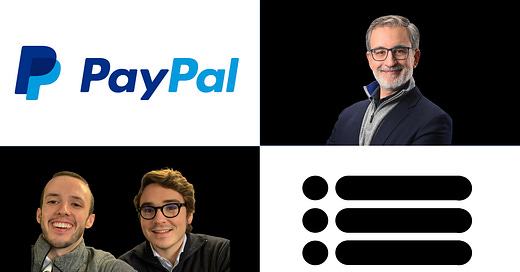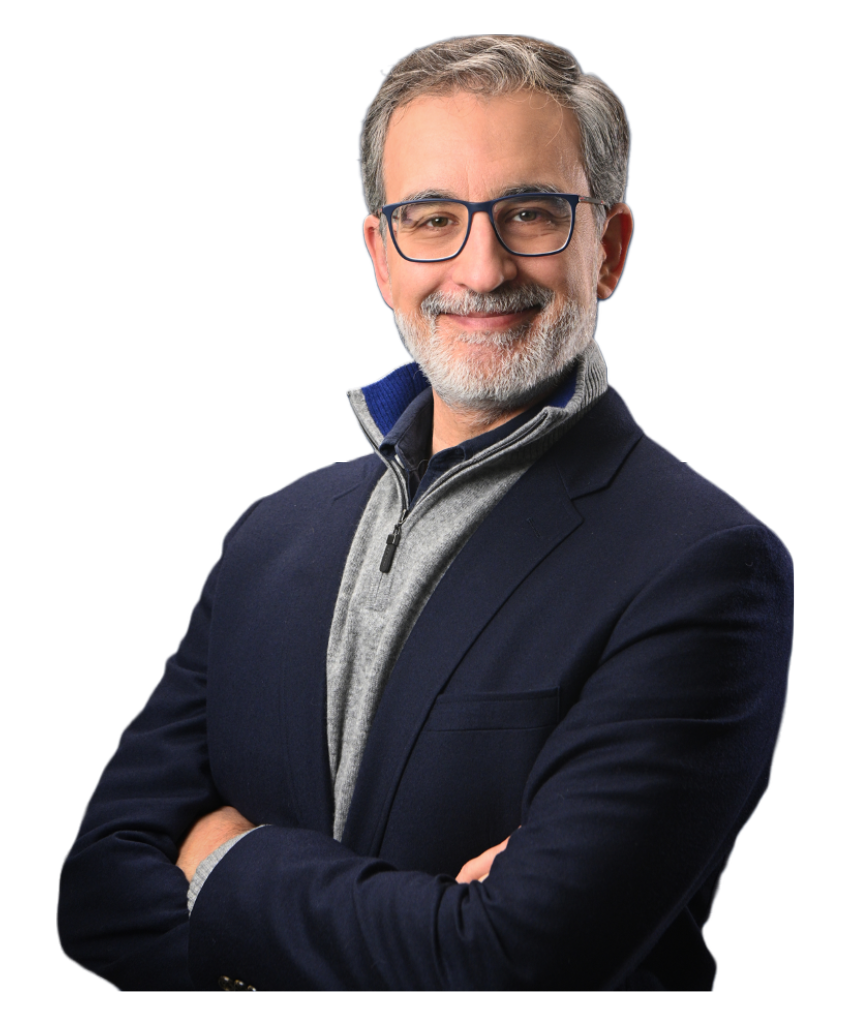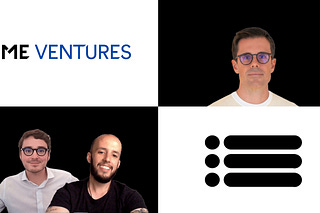

Discover more from Views
#28 Jose Fernandez Da Ponte: leading PayPal's blockchain efforts, top Web3 opportunities hidden in the winter
Senior Vice President and Blockchain lead at PayPal (legendary IPOed payments fintech w/ $90B+ market cap), Ex Executive Vice President at BBVA New Digital Business (Spanish bank w/ $30B+ market cap)
We are Pol Fañanás and Gerard García, two friends passionate about tech, startups, and VC, getting views from exceptional people doing cool things and sharing it for free with those who lack access. Thanks for reading!
Jose Fernandez da Ponte is Senior Vice President at PayPal and currently leads its Blockchain unit focused on ensuring end-to-end management of PayPal’s underlying crypto products, technology infrastructure, partnerships and regulatory foundations to drive growth in the space.
Previously Jose was Executive Vice President at BBVA New Digital Business (the San Francisco based innovation team of the Spanish bank where he played a leadership role in multiple investments, acquisitions, venture creations and in-house developments), Co-Founder & Partner at Quercus Equity Partners (Private equity firm where he invested and had operational roles in airlines and digital advertising companies, including being an investor and board member of Clickair, low cost airline eventually merged with Vueling), Engagement Manager at McKinsey and Tech Manager at HP.
Jose studied business at Universidad Pontifica Comillas and has a Master of Science from The London School of Economics and Political Science.
Summary
👤 Story: Galicia, HP, McKinsey, PE co-founder, BBVA digital, PayPal
🥇 Win: launching crypto at PayPal, building digital at BBVA, being an investor in Clickair through merger with Vueling
🚫 Fail and lesson: launching a business for the wrong incentives, passion + impact over money ends up as better driver of success
🚀 Great founder: differential believe, bet on tech breakthrough
💸 Great investor: technical talent in-house, support relevant tech innovation
📈 Markets: Web3, stable coins, NFTs linked to real utility, AI applied to fraud prevention, quantum computing applied to fintech
🦄 3 startups: Anchorage Digital, QCentroid, Wazuh, Lana
👍 3 investors: Alfonso Villanueva (PayPal), Hans Morris (Nyca Partners), Spencer Bogart (Blockchain Capital)
📖 3 books: “Complexity: A Guided Tour”, “The Structure of Scientific Revolutions”, “The Design of Everyday Things”
What is your story?
I’m born in Ferrol (Galicia), studied in ICADE (Madrid) and did a postgraduate degree at the London School of Economics.
Professionally I started working in HP and then McKinsey in 98 doing projects related to banking, telecom, private equity (PE) and payments.
Around 2005 and after 7 years in the firm, I left to join a PE fund as partner, helping fund, build and scale companies. As PE partner I worked in deals ranging from airlines (such as Clickair merge with Vueling) to digital advertising, including having very operational roles like CEO of a portfolio company for a few years.
In 2010, after the peak of the financial crisis, I had a serious sit-down with my family to think about the future and what made sense to do next. I came across a really interesting opportunity at PayPal and joined the team as Head of Strategy for Emerging Markets with a special focus on South America.
However after 5 years there I got approached by BBVA to help as one of the leads in a new digital unit based in San Francisco. This was an amazing experience and we were one of the 1st banks to be so committed to innovation, making acquisitions, building companies, investing, and closing tech partnerships with giants such as Google and Alipay.
Finally I came back to PayPal in 2019 to live the adventure of launching the crypto business here and helping bring this exciting technology to the company’s millions of users.
I know there is people who’d rather have all their path planned but it really wasn’t my case, I tried to optimize my actions based on working in something I loved and being with good talented people. This is how I walked my way.
What is the biggest win in your life?
Three things come to my mind.
First, being able to launch a strong crypto platform in PayPal, with great impact and pushing tech to production in such a massive scale. PayPal truly believes in the opportunity and it is fantastic to be in the center of something like this.
Second, I’d say my years in BBVA and the work we completed. I think what BBVA did with its digital unit it is not appreciated enough (specially in its origin country Spain), but BBVA, its president Carlos Torres, and all the team, really worked hard to pursue relevant commitment with innovation which resulted in the bank being one of the earliest corporate players in fintech. When you are leading an aircraft carrier it is not always easy and fast to move into new directions, but once you do the impact can be major. You need guts and I believe we had them and acted accordingly.
And finally, I really enjoyed the role I could play in Clickair as PE and board member, getting to the operational level, going from ppt to 6M passengers per year and ending up merging with Vueling.
What is the biggest failure and lesson?
I have more scar tissue around a situation with an education project we tried to launch but unfortunately failed. There was some value proposition and business sense but it wasn’t really mission driven and we lacked domain expertise.
I think it is okay to tackle a market opportunity even if you don’t know a lot about the market itself so that way you are not carrying any limitations from “the old ways of doing it”, but the big lesson coming from this experience is that having some unique market insight and a strong mission/vision fire within you, is of great importance.
Stuff like knowing how to make a business out of an opportunity and having exit awareness is obviously positive, but if you are in the game only for the money, I believe you’d probably risk following the wrong incentives and missing the shot.
After this moment, I applied the lesson to other decisive moments that came across and when I chose based on mission and impact rather than just money, I achieved more success and was able to navigate in a better fashion those inevitable rough patches that we all face.
What is your description of a great founder?
If you are going to build something from scratch, better be something you believe in. What do I see that others do not agree with? A great founder has more differential believes and less copycat consulting approach.
In this line, I’d add: better take technological risk than market risk. This is a personal view but I find much more interesting those teams that decide to go after a very challenging technological breakthrough that if it works out can conquer a market, instead of those who do a low risk product which implies high market risk, since you have to go and compete on pure sales execution with very similar players.
The company pitch decks of doing the Uber for X or copycats with geography as main differentiator are not something that excites me. Not because I don’t think they can be good investments (and much respect to this companies because they deserve it), but because I believe more in the sustainability of network effects based on technology advantage.
In Spain unfortunately I’ve seen a lot of the opposite culture but I hope to see more unique bold initiatives being done by Spaniards like those of AlienVault and Curai Health.
What is your description of a great investor?
Again, just sharing my personal view rather than giving advice because at the end of the day we are all students who learn constantly.
That being said, I believe venture capital funds could benefit from having more technical talent in-house. I have the chance to provide support to PayPal Ventures every now and then, and I see a bunch of companies that claim their product has an edge that it really doesn’t have. But we have a lot of technical talent to make this type of assessments constantly so it kind of shocks me when I see how a lot of VCs do not really have these skills inside the fund.
To build a more impactful portfolio, support relevant tech innovation and quickly understand what makes sense and what not, a great investor should be able to cover this gap.
What markets are you most interested in?
I love Web3 and being more specific, I think future development of stable coins can get very interesting.
Also, I find NFTs really exciting, not just as collective or art use cases, but because the potential of its digital property rights angle. The possibility of having an NFT linked to any asset such as a digital identity or a product/service with real trustworthy utility is compelling.
Beyond that, at PayPal we are constantly exploring new AI applications applied to fraud prevention and we believe we will see much more things in the future within this area.
And in the long term, even though it is more than likely that we will see many ups and downs in the space, quantum could be wild and as a corporation it makes sense to us to pay serious attention to its developments.
3 startups you like and why?
If I can say a few I’d say:
Anchorage Digital. I think infrastructure is one of the most interesting opportunities in blockchain and Anchorage does a great job making it simple for institutions to build products and use digital assets through an advanced and secure architecture for custody.
QCentroid. Early stage Spanish startup providing quantum technology solutions for Web3 use cases, lead by Carlos Kuchkovsky, a former colleague at San Francisco based BBVA digital unit where he had relevant tech lead roles and major impact.
Wazuh. Open-source security platform by the Spaniard Santiago Bassett with early backers such as Julio Casal, ex founder & CEO of AlienVault (Spanish threat intelligence company acquired by AT&T for $500M after raising over $100M+ from investors like Kleiner Perkins and Intel Capital).
Lana. Tech platform providing financial services to underserved clients in LATAM, with special focus on gig economy workers. Led by Pablo Muñiz.
3 investors you like and why?
Alfonso Villanueva (SVP of Strategy, M&A and Ventures at PayPal). In my opinion, the best Spanish angel that nobody knows about. He was the Senior Partner in McKinsey in charge of the Asia Pacific tech area, now he is close to PayPal’s CEO office and PayPal Ventures, and he is an exceptional investor with early bets in companies such as Spanish unicorn Jobandtalent. And a good friend I must add.
Hans Morris (Managing Partner at Nyca Partners). Hans plays a key role in one of the best fintech VCs I know, and he has a pretty impressive career, with previous positions as Managing Director at global growth equity fund General Atlantic, President of VISA and CFO of Citigroup.
Spencer Bogart (General Partner at Blockchain Capital). I have found in Spencer an investor who really understands the Web3 ecosystem, with a special sensibility towards the importance of the technical angle in this world as key factor to provide spectacular returns.
What books do you feel everyone should read and why?
“Complexity: A Guided Tour” by Melanie Mitchell. Good intro to the theory of complex systems. This book changed the way I look into many things - understanding how behavior appears without apparent cause, the effect of layers of complexities resulting in extraordinary outcomes, etc
“The Structure of Scientific Revolutions” by Thomas S. Kuhn. Even though it is a bit dense, I think an investor should really look into this book in order to increase clarity with regards how science evolves, differences between lineal improvement and total disruption, and how to optimize discovery.
“The Design of Everyday Things” by Don Norman. Great guide about how to keep the customer in the center of every product design decision you make, starting from the most common and simple building blocks.
WILDCARD QUESTIONHow does the future of Web3 payments look like, what opportunities does it hide and what advice would you give to founders and investors?
First of all, bear markets are for building and now is a good moment to get in.
About the future of payments, from infrastructure to use cases, payments with crypto on a massive mainstream scale needs more stable systems and solid regulations. New protocols and layer 2s such as Solana, Avalanche or Polygon are advancing impressively, but as we have recently seen, some approaches like algorithmic stable coins have taken a severe hit. This is obviously a challenge, both in terms of product but also in terms of adoption and reputation. However I still believe that in the midst of the mess we could find even bigger opportunities
Precisely, regarding opportunities that can end up as a very worthy pursue even tough we are navigating a tough winter, right now I’d like to highlight:
Crypto payments leveraging improved stable coin tech. As I mentioned earlier and despite the difficulties, I still think exciting possibilities are yet to be exploited.
Custody of NFTs. It is being solved in part but there are still pending problems such as the management of un-hosted wallets or trade off between security and usability (e.g. high friction workflow in order to participate in the market, made by discord + metamask + centralized exchange + decentralized exchange + NFT platforms).
Identity. The elephant in the room. How to properly manage attestations of federated identities on chain, identity related regulation impacting use cases such as mainstream payments, again management of un-hosted wallets, prevention against money laundering, validating payments business to business or human to business - to name a few.
Finally, some advice to founders and investors is: Do not underestimate technical nor regulation complexities. What I’ve experienced at PayPal is that during the last bull period we have seen a lot of flashy hype around proposals exclusively talking achieving user adoption virality (even if at times it was a bit by leveraging speculation), and not so much about technical nor regulatory muscle. Not covering these two factors in a proper way can kill the business in the long term.
Big thanks Jose for sharing your views with us!
Big thanks to you, reader, for your time and interest!
If you enjoyed it, subscribe and we’ll be back with you. 🙏🏼
Subscribe to Views
Getting views from exceptional people doing interesting things and sharing it for free with those who lack access








